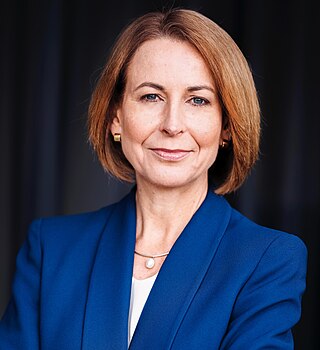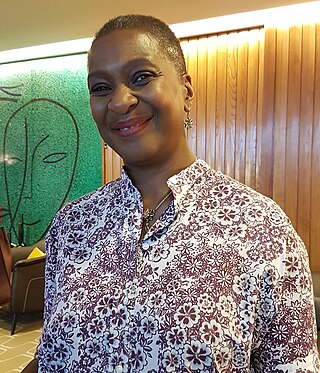Related Research Articles

Women's rights are the rights and entitlements claimed for women and girls worldwide. They formed the basis for the women's rights movement in the 19th century and the feminist movements during the 20th and 21st centuries. In some countries, these rights are institutionalized or supported by law, local custom, and behavior, whereas in others, they are ignored and suppressed. They differ from broader notions of human rights through claims of an inherent historical and traditional bias against the exercise of rights by women and girls, in favor of men and boys.

Mary Genevieve Gaudron, is an Australian lawyer and judge, who was the first female Justice of the High Court of Australia. She was the Solicitor-General of New South Wales from 1981 until 1987 before her appointment to the High Court. After her retirement in 2002, she joined the International Labour Organization, serving as the President of its Administrative Tribunal from 2011 until 2014.

Lionel Keith Murphy QC was an Australian politician, barrister, and judge. He was a Senator for New South Wales from 1962 to 1975, serving as Attorney-General in the Whitlam government, and then sat on the High Court from 1975 until his death in 1986.

Virginia Haussegger,, is an Australian journalist, academic advocate for gender equity, media commentator and television presenter.
Elizabeth Andreas Evatt, an eminent Australian reformist lawyer and jurist who sat on numerous national and international tribunals and commissions, was the first Chief Justice of the Family Court of Australia, the first female judge of an Australian federal court, and the first Australian to be elected to the United Nations Human Rights Committee.
Mary Julia Wade was an Australian palaeontologist, known for her role as the Deputy Director of the Queensland Museum. Some of her most renowned work was on the Precambrian Ediacaran Biota in South Australia.
Racial discrimination in jury selection is specifically prohibited by law in many jurisdictions throughout the world. In the United States, it has been defined through a series of judicial decisions. However, juries composed solely of one racial group are legal in the United States and other countries. While the racial composition of juries is not dictated by law, racial discrimination in the selection of jurors is specifically prohibited. Depending on context, the phrases "all-white jury" or "all-black jury" can raise the expectation that deliberations may be unfair.
Indigenous Australians are both convicted of crimes and imprisoned at a disproportionately higher rate in Australia, as well as being over-represented as victims of crime. As of September 2019, Aboriginal and Torres Strait Islander prisoners represented 28% of the total adult prisoner population, while accounting for 2% of the general adult population. Various explanations have been given for this over-representation, both historical and more recent. Federal and state governments and Indigenous groups have responded with various analyses, programs and measures.
Feminism in Italy originated during the Italian Renaissance period, beginning in the late 13th century. Italian writers such as Moderata Fonte, Lucrezia Marinella, and others developed the theoretical ideas behind gender equality. In contrast to feminist movements in France and United Kingdom, early women's rights advocates in Italy emphasized women's education and improvement in social conditions.

Women in Australia refers to women's demographic and cultural presence in Australia. Australian women have contributed greatly to the country's development, in many areas. Historically, a masculine bias has dominated Australian culture. Since 1984, the Sex Discrimination Act 1984 (Cth) has prohibited sex discrimination throughout Australia in a range of areas of public life, including work, accommodation, education, the provision of goods, facilities and services, the activities of clubs and the administration of Commonwealth laws and programs, though some residual inequalities still persist.
Australia has a long-standing association with the protection and creation of women's rights. Australia was the second country in the world to give women the right to vote and the first to give women the right to be elected to a national parliament. The Australian state of South Australia, then a British colony, was the first parliament in the world to grant some women full suffrage rights. Australia has since had multiple notable women serving in public office as well as other fields. In Australia, European women were granted the right to vote and to be elected at federal elections in 1902.
Patricia Lynn Easteal,, is an Australian academic, author, activist and advocate. She is best known for her research, publications and teaching in the area of women and the law. In 2010 she was made a Member of the Order of Australia 'For service to the community, education and the law through promoting awareness and understanding of violence against women, discrimination and access to justice for minority groups'.
Joyce Caroline ClagueMBE was an Aboriginal Australian political activist and Yaegl elder. Her activism centred on social change for Indigenous Australians. She was influential in instigating the 1967 Constitutional Referendum and in the 1996 native title claim, known as Yaegl #1, which was settled in 2015.
Myfanwy Horne was an Australian journalist, writer, reviewer and book editor.
This is a Timeline of second-wave feminism, from its beginning in the mid-twentieth century, to the start of Third-wave feminism in the early 1990s.

Iyiola Solanke is an Academic Fellow in the Inner Temple and Jacques Delors Professor of European Union Law at the University of Oxford, where she is a Fellow of Somerville College. Previously, she was the Chair in European Union law at the University of Leeds. She is specialized in the European Union and racial integration, and founded the Black Female Professors Forum in 2017.

Gloria Ouida Lee or Siew Yoke Kwan, also known as Gloria Purdy-Lee was a Chinese-Australian miner. She was the daughter of Alice Springs Chinese Market gardener Ah Hong and his Western Arrernte wife Ranjika. Lee travelled between Australia and China and experienced discrimination because of her mixed parentage. She is included in the archive collection of the Women's Museum of Australia, formerly known as the National Pioneer Women's Hall of Fame. Her oral history is held at the National Library of Australia.
Ngaire May Naffine is an Australian feminist legal academic and Professor Emerita at the University of Adelaide.
Elizabeth Anne Stanko is an American/British criminologist academic and researcher living and working in the UK. Stanko was awarded an Order of the British Empire (OBE) in the 2014 Queens Birthday Honours for her services to policing.

Garry Ellis Sturgess is an Australian journalist, writer, filmmaker, lawyer, publisher and oral-historian. He is currently the publisher of Franklin Street Press and the oral history and biography website Inside Lives.
References
- ↑ Francis, Rosemary (2016). "Jocelynne A. Scutt". Australian Women Lawyers as Active Citizens. Australian Women's Archives Project. Retrieved 30 January 2018.
- ↑ Easteal, Patricia (1998). Balancing the scales: rape, law reform and Australian culture. Federation Press. ISBN 978-1-86287-304-9.
- ↑ Sawer, Marian; Radford, Gail (2008). Making women count: a history of the Women's Electoral Lobby in Australia. University of New South Wales Press. ISBN 978-0-86840-943-6.
- ↑ Scutt, Jocelynne A., Dr; Australian Institute of Criminology (1980), Restoring victims of crime : a basis for the reintroduction of restitution into the Australian criminal justice system, Australian Institute of Criminology, ISBN 978-0-642-90203-0
{{citation}}: CS1 maint: multiple names: authors list (link) - ↑ National Conference on Rape Law Reform (1980 : Hobart, Tas.); Scutt, Jocelynne A., Dr, 1947-; Australian Institute of Criminology (1980), Rape law reform : a collection of conference papers, Australian Institute of Criminology, ISBN 978-0-642-89991-0
{{citation}}: CS1 maint: multiple names: authors list (link) CS1 maint: numeric names: authors list (link) - ↑ Australian Institute of Criminology (1984), "Information bulletin of Australian criminology", Information Bulletin of Australian Criminology, New Series, The Institute, ISSN 0813-6998
- ↑ "CORRECTIONS". The Canberra Times . Vol. 60, no. 18, 406. Australian Capital Territory, Australia. 22 February 1986. p. 3. Retrieved 6 October 2018– via National Library of Australia.
- ↑ Seminar on the Jury (1986 : Australian Institute of Criminology); Challinger, Dennis; Australian Institute of Criminology (1986), The Jury : proceedings of a seminar on the jury 20-22 May 1986, Australian Institute of Criminology, ISBN 978-0-642-10251-5
{{citation}}: CS1 maint: numeric names: authors list (link) - ↑ "Scutt fires farewell salvo". 28 October 2004.
- ↑ "Govt appoints new Anti-Discrimination Commissioner". Australian Broadcasting Corporation . 28 October 2004.
- ↑ ""Scutt, Jocelynne Annette, (AO) (1947-)"". Trove. Retrieved 5 February 2025.
- ↑ Board, International Alliance of Women
- ↑ The Hon. Dr Jocelynne Scutt. Retrieved 31 May 2017
- ↑ "Jocelynne ScuttCounty Councillor for Arbury Division" . Retrieved 17 March 2023.
- ↑ Councillor Jocelynne Scutt. Retrieved 31 May 2017
- ↑ "Trove". trove.nla.gov.au. Retrieved 17 March 2023.
- ↑ It's an Honour. Retrieved 19 June 2016
- ↑ "Victorian Honour Roll of Women 2001" (PDF).